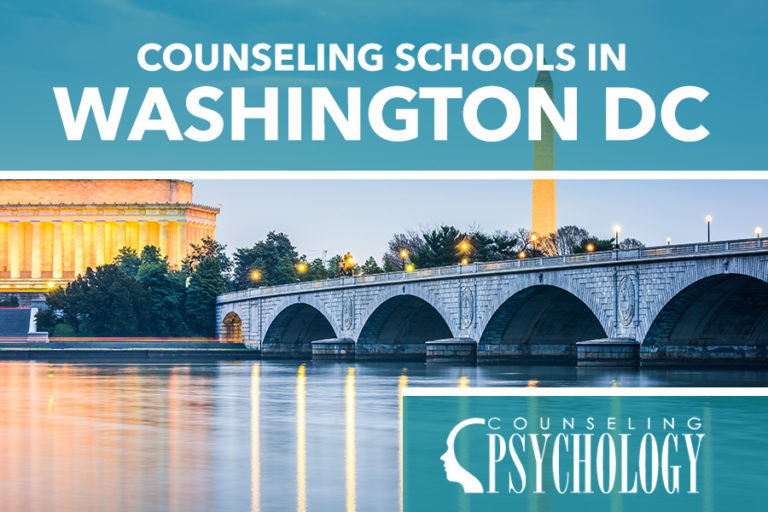Best Counseling Schools in Washington, DC
Washington, DC is a diverse city with many different needs, including various counseling needs. There are also excellent schools within the nation’s capital that have degree programs for counselors. If you’re interested in a counseling career, here are the best counseling programs in Washington, DC.

How to Find a Counseling Program in Washington, DC
You'll find no shortage of counseling degree programs in Washington, DC, but not every program will be the right fit for you. Specifically, look for a program that matches your current needs and future aspirations. These can include financial assistance needs, class schedule needs, academic goals, career goals, and other factors.
Counseling Degree Pathways in Washington, DC
Counseling degrees are available at every level of postsecondary education. Depending on your needs and goals, you might choose one of the following degree pathways:
- Associate Degree: Usually a two-year program that qualifies you for entry-level counseling jobs. Requires high school first.
- Bachelor's Degree: Usually a four-year program that qualifies you for entry- and mid-level counseling jobs. Requires high school first.
- Master's Degree: Usually a one to two-year program that qualifies you for licensure (after some other steps). Requires a bachelor's first.
- Doctorate Degree: Usually a three to six-year program that specializes in either clinical services (Psy.D.) or research (Ph.D.). Requires a bachelor's or master’s depending on a specific program's competitiveness, and qualifies you for the highest positions.
- Graduate Certificate: Usually a one-year program or shorter, and allows you to specialize. Requires a bachelor's first, but can also be done after a master's.
Choose a Counseling Specialty
Many counseling degrees and virtually all graduate certificates afford opportunities to specialize. You might specialize if you want to work with a specific population or want to address a particular need. Some potential specializations are:
- Clinical mental health counseling
- Pastoral mental health counseling
- School counseling
- Human development counseling
- Other specialties
Check School Accreditation
Regardless of your chosen degree and specialization, any counseling program you apply to should be accredited. Accreditation means that other institutions have verified the program, and the program meets academic standards and will be widely accepted.
Washington DC requires that a school is dually accredited by the Secretary of the United States Department of Education and the Council on Postsecondary Accreditation. The Council for the Accreditation of Counseling and Related Education Programs (CACREP) accredits actual counseling programs.
Online vs. Traditional Counseling Programs in Washington DC
Accredited counseling degree programs are available through both online and traditional formats. Between the two options, online programs tend to have the lowest tuition costs and the greatest flexibility. Only traditional programs have the in-person classroom experience, however, and they may afford better networking opportunities. Which one you choose should depend on your particular needs.
Becoming Licensed as a Counselor in Washington, DC
To be licensed as a counselor in Washington, DC, you must pass an exam and pay a fee. Several prerequisites need to be met before you can sit for the exam, though. The prerequisites are to:
- Complete an accredited master's degree in counseling or a similar field
- Complete an internship/practicum as part of the master's degree
- Complete a minimum of 3,500 hours of supervised work within two years of graduating
Once you're licensed, the license has to be renewed by December 31st of every even-numbered year (e.g. 2024, 2026). You need 40 hours of continuing education before you can renew.
List of Counseling Degree Programs in Washington, DC
Are you searching for a counseling degree program in Washington, DC? Browse our comprehensive list of schools offering counseling programs, both online and on-campus, and follow the links to learn more about what each program has to offer.
